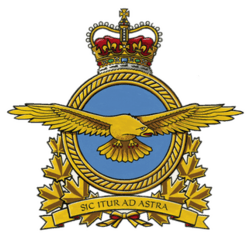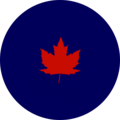Royal Canadian Air Force facts for kids
Quick facts for kids Royal Canadian Air Force |
|
|---|---|
| Aviation royale canadienne (French) | |
| Founded | 1 April 1924 |
| Country | Canada |
| Type | Air force |
| Role | Aerial warfare |
| Size | 391 operational aircraft Personnel: Regular Force 14,500 Reserve Force: 2,600 Civilians: 2,500 |
| Part of | Canadian Armed Forces |
| Headquarters | National Defence Headquarters, Ottawa, Ontario |
| Motto(s) | Latin: Sic Itur ad Astra, lit. 'such is the pathway to the stars' Latin: Per ardua ad astra, lit. 'through adversity to the stars' – (1924 to 1968) |
| March | "RCAF March Past" |
| Anniversaries | Armed Forces Day (first Sunday of June) |
| Engagements | Second World War • Battle of Britain • Battle of the Atlantic • Battle of the St. Lawrence • European Bombing campaign • Western Front Korean War Gulf War • Operation Friction Operation Deliberate Force Kosovo War • Operation Echo War in Afghanistan Intervention in Libya • Operation Unified Protector • Operation Mobile Military intervention against ISIL • Operation Impact |
| Commanders | |
| Commander-in-chief | Charles III, King of Canada represented by Julie Payette, Governor General |
| Commander of the Royal Canadian Air Force | Lieutenant-General Al Meinzinger |
| Chief Warrant Officer of the Royal Canadian Air Force | Chief Warrant Officer J.R.D. Gaudreault |
| Insignia | |
| Roundel |   |
| Fin flash | |
| Flag |  |
| Aircraft flown | |
| Fighter | CF-18 Hornet |
| Helicopter | CH-139 JetRanger, CH-146 Griffon, CH-147 Chinook, CH-148 Cyclone, CH-149 Cormorant |
| Patrol | CP-140 Aurora, CP-140A Arcturus |
| Reconnaissance | CU-170 Heron, |
| Trainer | CT-114 Tutor, CT-142 Dash-8, CT-155 Hawk, CT-156 Harvard II |
| Transport | CC-115 Buffalo, CC-130H Hercules, CC-130J Super Hercules, CC-138 Twin Otter, CC-144 Challenger, CC-150 Polaris, CC-177 Globemaster III |
The Royal Canadian Air Force (RCAF) is Canada's air force. It is also known as the Aviation royale canadienne in French. Its main job is to provide strong air support for the Canadian Armed Forces. The RCAF is one of three main parts of Canada's military.
As of 2013, the RCAF had about 14,500 full-time members. It also had 2,600 part-time members and 2,500 civilians. They operate many aircraft, including planes and drones. The current leader of the RCAF is Lieutenant-General Al Meinzinger.
The RCAF handles all aircraft operations for the Canadian military. It helps keep Canada's airspace safe. It also provides aircraft to support the Royal Canadian Navy and the Canadian Army. The RCAF works with the United States Air Force to protect the airspace over North America. This partnership is called North American Aerospace Defense Command (NORAD). The RCAF also leads Canada's search and rescue efforts.
Contents
History of the RCAF
How the RCAF Started
The RCAF began as the Canadian Air Force in 1920. In 1924, King George V gave it royal approval. This is when it officially became the Royal Canadian Air Force.
Changes Over Time
In 1968, the RCAF joined with the Royal Canadian Navy and the Canadian Army. This was part of a plan to unite all Canadian military forces. Air units were then divided into different groups. These groups included those for air defence, air transport, and tactical fighters.
In 1975, many of these separate air groups were combined. They all came under one new command called Air Command. In August 2011, Air Command changed its name back. It became the "Royal Canadian Air Force" again.
RCAF in Major Conflicts
The Royal Canadian Air Force has served in many important events. These include the Second World War and the Korean War. They also took part in the Persian Gulf War.
The RCAF has also been involved in United Nations peacekeeping missions. They have supported many NATO operations too. As a NATO member, the RCAF had a presence in Europe for a long time.
Images for kids
-
An RCAF CIM-10 Bomarc missile on a launch erecter in North Bay. This missile was controversial because it could carry nuclear weapons.
See also
 In Spanish: Real Fuerza Aérea Canadiense para niños
In Spanish: Real Fuerza Aérea Canadiense para niños
 | DeHart Hubbard |
 | Wilma Rudolph |
 | Jesse Owens |
 | Jackie Joyner-Kersee |
 | Major Taylor |






